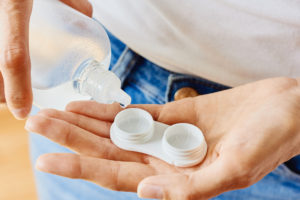
The eyes have been identified as an entry point for the virus, where tiny water droplets can enter the body. The virus can also enter through the eyes if they are touched after contact with an infected surface.
If you wear contact lenses, you’re touching your eyes every day. If you forget to wash your hands before inserting or removing the lens, you’ve put yourself at risk.
For the course of the pandemic, the American Academy of Ophthalmology has recommended limiting the use of contact lenses and switching to eyeglasses if possible. Eyeglasses don’t require eye-touching and can even block droplets from entering the eye.
The organization does point out, however, that there is no evidence showing that wearing contacts can boost the risk for COVID-19. But it does seem that glasses might be the best option if you need corrective lenses.
Even glasses will not guarantee freedom from risk. Droplets can still enter through the sides or above the frame, and viruses, although unlikely, can get on your lenses or frames.
To limit the risk of contracting a virus through your eyes, make sure you’re washing your hands regularly and avoid touching your face. Washing your hands before touching your glasses is also recommended.
Wash your glasses each day using warm water and mild soap before drying with a microfiber cloth. This will prevent the lenses from scratching. It’s also recommended that you avoid hanging glasses with straps around your neck, or putting them down on surfaces you aren’t sure are clean.
Overall, the risk of contracting the coronavirus from your eyewear is pretty low. Glasses are the preferred way to go during the pandemic. As long as you’re practicing social distancing, good hand hygiene, and limiting face touching, you should be okay.